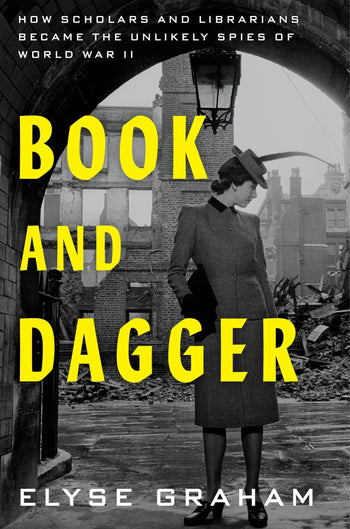About a year after I completed my Ph.D. in modern literature, during which time I’d had no luck landing employment, I approached a well-known literary scholar for his counsel. “Greg,” he said conspiratorially, “have you ever thought about working for the company?” “Dr. ___, I don’t really want to go into private industry.” “No, Greg; I mean the company. I can get you in.” Gobsmacked, I thought to myself, This guy doesn’t know his audience. Neither our politics nor my skills. Hard pass.
My assumption that humanist academics were all on the left was foolish, of course. But so was my defeatist certainty that grad school hadn’t trained me for anything useful. In fact, as Elyse Graham shows in her snappy and entertaining Book and Dagger: How Scholars and Librarians Became the Unlikely Spies of World War II, humanists and their comma-hunting, cross-referencing, collecting, and cataloging ways made pivotal contributions to America’s war effort in Europe, and may well have ensured its success.
With few exceptions, these scholar-spies did their work not in the uniformed branches but in the Office of Strategic Services, or OSS, the precursor to the CIA and the country’s first dedicated intelligence agency. Officially created about six months before Pearl Harbor and led by the World War I hero General “Wild Bill” Donovan, the OSS was initially an information-gathering and analysis agency, but by mid-1942 had expanded into “operations”: spy work. The book’s central figures are Joseph Curtiss, a “mild-mannered English professor from Yale”; Adele Kibre, a University of Chicago classicist; and the blustering and profane, not-at-all-mild-mannered Yale history professor Sherman Kent, who later held a high national security position in the Eisenhower administration, though Graham also recounts the stories of dozens of others librarians, archivists, mathematicians, and anthropologists who lent their brains to the OSS.
Although we likely picture ingenious feats of deception and infiltration when we think of the OSS, in this book Graham persuasively argues that the spy agency’s most consequential achievements were in fact its innovative and resourceful methods of collecting, organizing, and weaponizing information, much of which was already publicly available. “There was no way,” she claims, that the OSS could have caught up to its much more experienced rivals and adversaries when it came to spy work, so instead “they reinvented intelligence” by finding information that others dismissed or ignored and letting the tweed brigade work their wonders on it. These scholar-spies “expanded—dramatically—what counted as intelligence and what kind of person would make a good spy.” In so doing, the OSS reshaped espionage in ways that would later influence the design of the CIA and other intelligence-gathering agencies during the Cold War, and did so in “the American way: welcoming strangers, seizing the practical gains of diversity, finding common cause between aristocrats and thieves.” It was the humanists, in other words, who won the war.
